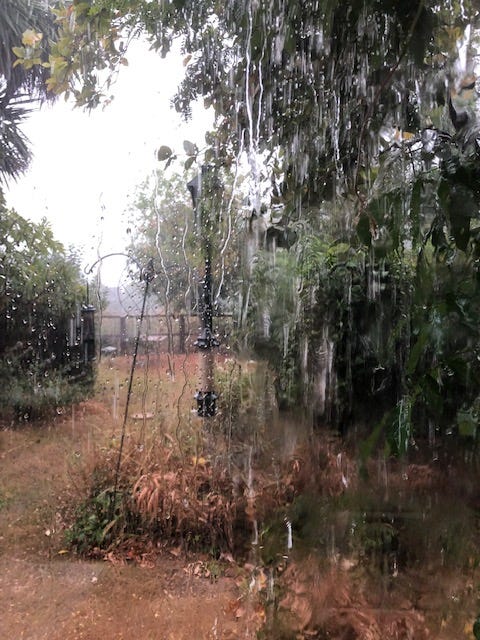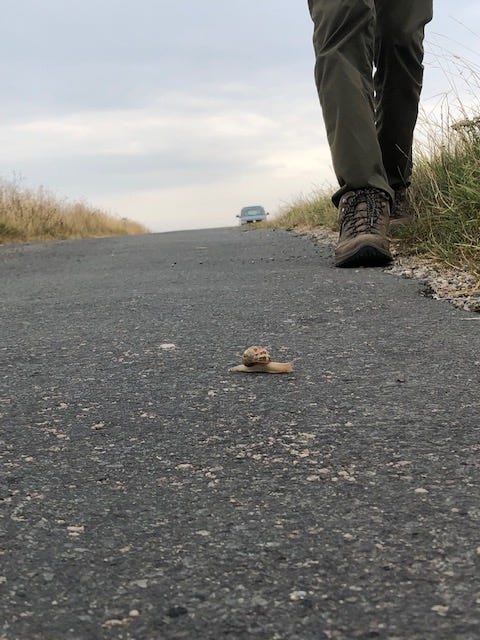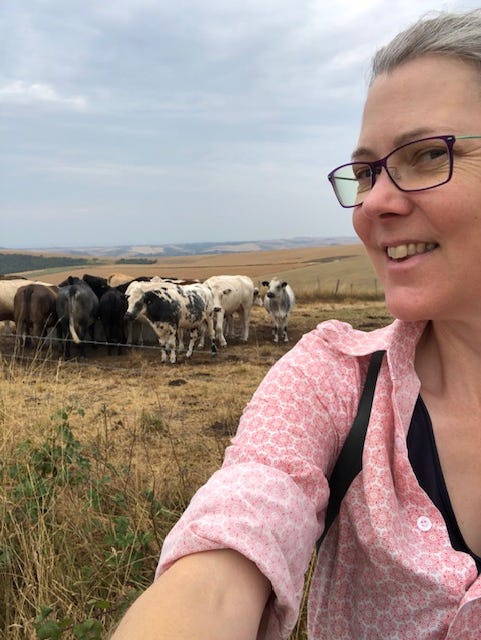20. When average weather becomes extreme
BREAKING NEWS: A British person talks about the weather. 😉
Dear Reader,
Where I live in the UK the weather is what I’d describe as pretty average, typically lacking in extremes at either end of the scale.
I hesitate to use the phrase ‘these are unprecedented times’, it having driven me to distraction since starting to hear it on a loop since the start of the Covid 19 pandemic, but we’ve had two heatwaves in a matter of weeks. I know it’s summer, but this is unusual.
The first one – for which the Met Office had declared its first-ever red warning specifically for heat – lasted for just three days, but delivered a high of 41°C (105.8° F) at its peak.
The second, with its peak of 34.9°C (94.8°F), was the longest in 15 years in south-east England, with temperatures having passed the threshold of 28°C (82°F) on nine consecutive days.
And in a recent news report the BBC described the season as ‘the driest summer since the nineteenth century’.
But this morning the weather finally broke: the no-end-in-sight heatwave has paused at last for breath. Our garden had really been suffering, and despite feeling very sorry for the parched grass I’ve been loving the fact that I haven’t had to cut it since June.
Last night – again – was sweltering, the unfamiliar cloud that had bloomed late afternoon swaddling the already stifling land under a huge, dessicating bubble. For weeks I’ve been unable to escape the heat, and last night Mother Nature rebelled against her very self by trapping the hot air beneath a blanket of her own making.
At six this morning the sky was a pinky orange, and everything felt unsettled. At breakfast time, sporadic tiny raindrops began hitting the plastic conservatory roof: this was it! By ten, thunder and lightning had arrived, and suddenly the rain was coming down in stair rods. Stepping outside to drink in the moment, I turned my face to the sky, and realised too late that I was still wearing my glasses. I hate it when my glasses get rained on, and dashed back into the house to watch from inside.

The thunderstorm was a complete reboot for the weather of the past weeks, and because the world around us was by lunchtime a comfortable temperature, we headed to Firle Beacon for a walk. This new air had some substance, some moisture to it, and breathing in the petrichor1 was like tasting champagne. This was my first walk for well over a week, and it felt absolutely wonderful.

I’m looking forward to the lawn turning green again, although I suppose that will mean I’ll have to get the mower out.
The most surprising British weather in my life so far came in 1987, when the ‘Great Storm’ hit the southern part of England and northern France of the night of October 15th-16th. Again, unprecedented. After a disturbed night, at first light we all watched from my bedroom window as tree after tree fell like ninepins in the wood at the bottom of our wind-savaged garden.

There had been no warning. Or had there? Well, it was complicated. Met Office and BBC weatherman Michael Fish had uttered these words in his weather report just hours before the storm:
‘Earlier on today, apparently, a woman rang the BBC and said she heard there was a hurricane on the way; well, if you're watching, don't worry, there isn't.’
Despite Fish’s later attempts to clarify what he’d said2, a clip of the 'gaffe’ has been doing the rounds ever since.
As a result of the Great Storm over twenty people lost their lives, and services and infrastructure were a mess. And the landscape had changed overnight: the local National Trust garden where my brother would later be apprenticed to the head gardener suffered the loss of specimen trees of national significance. Sevenoaks in Kent, the next-door county to ours in East Sussex, lost six of its seven eponymous oaks. The name rightly remained, but its residents mourned the loss of part of their identity.
We couldn’t get to school. Dad and many of our rural village neighbours spent days working on fallen trees with their chainsaws to clear the roads. We had no power, and this would remain the case for over a week.
The first afternoon we dug our emergency stash of candles out of the cupboard under the stairs and set about placing them in convenient spots around the house. We began to light them. A few minutes later we heard the piercing siren of the battery-operated smoke alarm in the hall: the beautiful handmade paper and pressed flower lampshade that had been our mother’s birthday present had gone up in flames. Naïvely I had put a candle just beside the lamp, and lit it. I was devastated to see the results of my carelessness.
‘It was common sense for me to put the candle where we normally have a light on!’
I was crying.
‘It would have been better sense not to’, said Dad, putting the fire extinguisher down and giving me a hug. ‘It’s fine. We’re fine.’

Power had been restored to the British Telecom network fairly quickly after the storm, and Mum rang Grandma, in another part of the country, to report that we were alive and well. ‘We haven’t got any electricity or hot water, though.’
Grandma was relieved. ‘There are such awful, awful pictures on the news! I’m so glad you can’t watch television – you’d be absolutely horrified!’
Mum grinned. ‘We’re in it, Mum. We don’t need the telly.’
With our oil-fired range providing us with an opportunity to cook that our neighbours with only electric stoves didn’t have, our kitchen had quickly become the village cookhouse. Local people would arrive clutching dripping containers of half-thawed food from their dead freezers, and diverse ingredients would be pooled to create unrepeatable plats du jour to be shared by candlelight in the dim dining room.
This was fun: we ate like kings, and got to know so many people. In normal circumstances we lived a fairly isolated existence: with no pavements at all along a very busy main road to link our spread-out houses we’d always found it difficult to socialise locally. Yes, we had neighbouring houses within eyeshot, but we’d never made a habit of just popping down the road to another house, because the road was just so dangerous.
We certainly didn’t need to worry about traffic at the moment.
A kind neighbour offered hot baths. She had a generator, and was using this to power her electric immersion heater. This was a wonderful offer. The four of us set off en masse, and later, arriving home with big smiles and damp hair, we found a note that had been pushed through our letterbox.
‘You’ve got ELECTRICITY, you lucky things!’
What? No we hadn’t. The note was from J, a family friend. The note was odd, and my mother seemed worried.
‘We’re going to see J, and I’m taking wine.’
All the way to J’s house the road was eerily empty apart from scattered leaves, jumbled-up branches and piles of damp sawdust.
J looked upset. ‘You didn’t tell me that your power’s back on!’
‘It isn’t! We’re still off, like everybody else.’
‘I RANG YOUR DOORBELL!’
Mum laughed. ‘It’s a battery one!’ She opened the wine. ‘Not chilled, I’m afraid. But you know that already.’
The next week was our school’s half-term break, and we were due to head to the north of England on holiday. Even once we’d finished packing the car my brother and I were still running in and out of the house fretting about the sort of random stuff we would always leave to the last minute.
‘I can’t wait for this, can you? Even if it rains all week at least we’ll have electricity up there!’
With that, the hall lights flickered on, and a tinny cacophony of electronic beeps could be heard from an assortment of gadgets that were plugged in around the house.
‘IT’S BACK ON!’
Amazed at the lucky timing, we rushed around turning off lights. The fridge and freezer had kicked into life: these were empty and clean, all the food having either been swiftly used or regretfully ditched as soon as the prolonged lack of cooling had rendered it inedible. We couldn’t stick around to revel in the charged-up glow of newly-restored power, though: we were off on holiday!
That evening, after the long drive north, we had dinner in a posh-for-us restaurant my father had booked. It was full, and other diners chatted and murmured to each other as they enjoyed their food in handsome surroundings.
I should have been enjoying this rare treat. Instead, I looked down at my plate, feeling sad.
Mum was concerned. ‘Whatever’s the matter?’
‘I HATE CANDLES! It’s so dark! Can’t you get them to turn the lights on?’
Love,
Rebecca
If you enjoyed this post, please let me know by clicking the heart. Thank you!
Have you ever been affected by atypical weather events for your area? Do share!
Thank you for reading! If you enjoy ‘Dear Reader, I’m lost’, please share and subscribe for free.
Petrichor is the smell of rain. The word comes from the Greek words 'petra', meaning stone, and 'ichor', which in Greek mythology refers to the golden fluid that flows in the veins of the immortals.
(from www.metoffice.gov.uk)
BBC meteorologist Michael Fish drew particular criticism for reporting several hours before the storm hit:
Earlier on today, apparently, a woman rang the BBC and said she heard there was a hurricane on the way; well, if you're watching, don't worry, there isn't, but having said that, actually, the weather will become very windy, but most of the strong winds, incidentally, will be down over Spain and across into France.
Fish has subsequently claimed that his comments about a hurricane had nothing to do with the UK; they referred to Florida, USA, and were linked to a news story immediately preceding the weather bulletin, but had been so widely repeated out of context that the British public remains convinced that he was referring to the approaching storm. According to Fish, the woman in question was actually a colleague's mother who was about to go on holiday in the Caribbean, and had called regarding Hurricane Floyd to see if it would be safe to travel. Fish has also claimed that "nobody phoned up" and that she was a "non-existing woman", apparently contradicting the previous declaration, when interviewed about Anita Hart's claims of being the woman who made the call.
Fish went on to warn viewers that it would be "very windy" across the south of England, but predicted that the storm would move further south along the English Channel and the British mainland would escape the worst effects. The remainder of his warning has frequently been left out when this forecast has been repeated on television, which only adds to the public’s misconception of that day's forecasting. His analysis has been defended by weather experts. In particular, the lack of a weather ship in the Southwest Approaches, due to Met Office cutbacks, meant the only manner of tracking the storm was by using satellite data, as automatic buoys had not been deployed at the time.
(from Wikipedia)





Weather is so exciting for me, mostly because I come from a corner in the U.S. where nothing happens (San Diego, CA). When it rains, well...let's just say it's an event.
Great story and I especially loved the snail picture...they always remind me to go at my pace. :) Have a great weekend Rebecca!